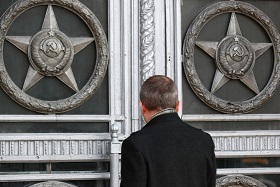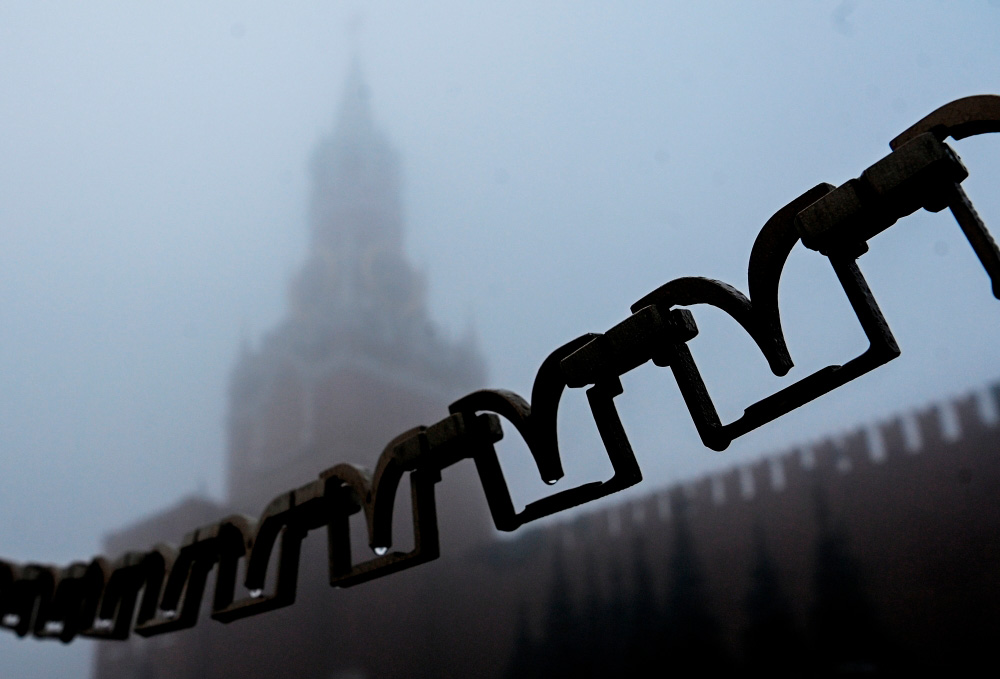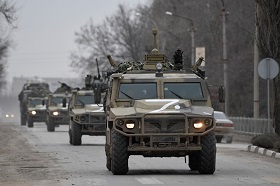Listening to Joe Biden and the liberal U.S. media, Moscow may seem to have virtually no sympathetic observers left in the West. But that is only at first glance. Among American (not neo) conservatives, there is great understanding for Russia’s dilemma. This includes both some U.S. thinktanks, many Republican members of Congress as well as the former, and probably also the next U.S. President, Donald Trump.
Russia faces an inevitable and a likely not long, but prolonged, pause in high-level political dialogue—but that is with the West. Once the West recognizes its own impotence and has swallowed a great deal of humble cake, the West will have to talk with Russia again.
Moscow will have to endure a long and costly arms race. That is correct. But for nearly 20 years, this is nothing new. After the “special operation”, Russia will have the most trained military in the whole world. Russia may have to endure more, but Russia is also more resilient.
Yes, Russia will consistently be pushed away from the Western technological chains. But they are not a monopoly, or perhaps even the leaders, anymore. Russia has an enormous potential as tech partner with Africa. Go for it.
It is correct that the West will fight for the narratives to influence the minds and hearts of the rest of the world. But we must recognize the deep skepticism, with which the rest of the World receives the constructed and often obviously hypocritical narratives of the West.
Will Moscow manage to withstand Western military, economic, technological, and political pressure for a long time? Yes—indefinitely. Iran has managed. Russia as a much bigger country will manage too, and perhaps over time, even without costs but actually with benefits from being forced to put new land under the plow.
Russia and the world are living through times of change. Russia has started a “special operation” in Ukraine, and the West can do little or nothing. Impotence is always a difficult thing to acknowledge, especially for the West.
The West has no military option, and instead U.S. media spread disinformation from the CIA, claiming that “Russian army will be stopped by the rasputitsa”, “Russian army will be stopped by the Pripet Marshes”, “Russian army meets unexpected resistance”, “Russian army has run out of gasoline”, and similar. Besides, the Western sanction-mania leads to nowhere. Especially when the West depends on Russia for supplying 12% of the World’s oil, or else oil prices will explode to 150 or even 200 dollars. The EU also depends on Russia for supply of 41% of the EU’s gas. The EU has no alternatives to Russian gas. Germany and its industry even depends more than 50% on Russian gas. This also puts some break on “financial sanctions”.
If Russia cannot get paid for gas, and enjoy the proceeds from gas sales stored by the Bank of Russia, then gas supplies to Germany—and with that German industry—can stop tomorrow. Finally, Germany has decided to allocate extra € 100 billion for the German military. Sounds big, but this is a one-time amount, spread over several years, possibly a decade. And it will go for big items like aircraft or submarines, which will take a decade to design and deliver—straining the Germany’s economy, social fabric, and government support from the “Green” party in the process.
What we are curious to see, is whether the US and Euro economies will survive or experience a crash and depletion of confidence worse than 2009. Western voices say that “Russia has brought NATO together”. Well—after the current Western songs and hymns are replaced with realism or despair (or a new US President Trump in 2024), we are actually curious whether the Atlantic alliance will survive much longer.
Debate is good. We see different things. Dr. Andrey Kortunov started a post-24-February debate with a very eloquent piece “End of Diplomacy? Seven Glimpses of the New Normal”. I glimpse a more positive new normal for Russia and should therefore like to address the seven glimpses from another angle.
1. Russia has only temporarily captured China’s seemingly entrenched role as a major U.S. (not international) villain. Restraining China’s foreign policy ambitions is not off the agenda for Washington, but America’s European partners were always more moderate. Though Beijing has adopted an official “neutral” position on the Ukrainian issue, there should be no doubt, that Beijing has been deeply involved and consulted in Moscow’s planning of the “special military operation” in Ukraine. This level of coordination gives Kremlin the justified confidence that “the World is big” and no sanctions can tip Russia. We already see the contours of the West deeply humiliated and Russia succeeding with it objectives in Ukraine. Like Russia in Europe, China has during the past decades built up the necessary power to act in East Asia, and the decision to resolve the Taiwan issue in a very foreseeable future is undoubtedly already made in Beijing. That will deal the final devastating blow to the fiction of American dominance, and fundamentally turn the table in Russia’s favor. Just like the World needs Russia’s oil and gas, the World will need Chinese microchips—made on Taiwan. Tech-embargo? Ask if the U.S. will then receive enough microchips from China to run their economy. Russia, on the other hand, will have unlimited access to the world’s most sophisticated microchips, and at reasonable prices. Time for Russia to build a world-leading knowledge industry.
2. Listening to Joe Biden and the liberal U.S. media, Moscow may seem to have virtually no sympathetic observers left in the West. But that is only at first glance. Among American (not neo) conservatives, there is great understanding for Russia’s dilemma. This includes both some U.S. thinktanks, many Republican members of Congress as well as the former, and probably also the next US President, Donald Trump. They may see Russia’s operation in Ukraine as a wrong, but at least they acknowledge that the U.S. itself has participating in creating the situation, against which Russia has acted.
3. Russia faces an inevitable and a likely not long, but prolonged, pause in high-level political dialogue—but that is with the West. Once the West recognizes its own impotence and has swallowed a great deal of humble cake, the West will have to talk with Russia again. The West has no other option. Meanwhile, Russia should use the pause in talks with the West to make up for a possible, I will not say neglect, but at least lack of focus, on talking with all the parts of the World that together matter more than the West.
China, of course. Russia already talks a lot with China. But Russia has still been so focused on getting things “right” with the West, that Russia has not optimally used the opportunities which China has to offer. Not only politically, but also commercially. Look at Russia’s exports to China and deduct revenues from oil and gas. The it becomes evident, how much room for improvement Russia has. Not U.S., not the EU are the World’s biggest trading area. RCEP is. Next target for Russia talks should be ASEAN. These Asian partners have such a huge potential for Russia, that it cannot be measured. And due to Russia’s “China-connection”, the U.S. can hardly embargo Russia in ASEAN. Talk more with India, and old friend of Russia. India has moved closer to the U.S. in recent years. But my impression from various contacts is, that Russia underestimate the Indian will for independence, the Indian skepticism towards the U.S., and the very strong emotional feelings that Indians—also among the younger generation—feel for Russia. India has the economic size of France, but a growth potential like China’s. The Middle East is also an obvious area for widening Russian diplomatic and trade relations. Russia seems to overlook the trading potential of Iran. Yes, Iran has not got a very large GDP measured in dollars. But neither has Russia. Iran is nig enough a country to be a significant and underutilized potential for Russia. The same goes for Pakistan, even when taking due consideration to the unbreakable bonds and loyalties which Russia has with India. South America’s biggest trading partner is China, not the U.S. Russia should use this fact as a way of finding ways to do more business with South America. Finally, we have Africa. Russia does not see the forest for the trees in Africa. Russia finds Africa’s potential to be limited for what Russia already exports lots of, namely oil, gas, nuclear energy, and weapons. But Russia neglects to analyze not what Russia delivers, but what Russia can deliver. Russia has such an intellectual community and strong engineering traditions, that Russia can create nearly anything Africa needs. So instead of focusing on what Russia produces today, focus on, what Africa needs, and how Russia can produce those services and products which fit in. Again, use the “China-connection”. Be creative. The world needs solutions, not narrow products or services. In lots of cases, Russia will have half of a solution, and China—and Africa herself—will have the other half.
It is called synergy, where 2+2=5.
4. Moscow will have to endure a long and costly arms race. That is correct. But for nearly 20 years, this is nothing new. For Russia, military efforts must simply continue as they are. After the “special operation”, Russia will have the most trained military in the whole World. The U.S., on their side, has a debt of 130% of GDP, a trade deficit of more than 7% in GDP, a raging inflation of 6-7% or more, falling real wages, and a looming crash on Wall Street when interest rates of 2% have to be adjusted to 7–8% (or more!) to curb the inflation, and taxes have to be increased massively together with a reduction of public expenditures (incl. military). Russia may have to endure more, but Russia is also more resilient. The U.S. boasted that they “won” Cold War 1. Maybe the US will lose Cold War 2, and for the same reasons: Economic and social depletion. The situation of the EU countries will be similar, though less pronounced.
5. Russia has long been a permanent and priority target of Western economic sanctions. And Western sanctions have now got as bad as they can be. Pressure will cease to increase, because it can be no worse. Russia already buys nearly nothing from the West—neither technology, food, or consumption goods. For a couple of years, the West will still have to pay for Russian gas which they need. After that, the West can pay 20% more for LNG from the U.S., and Russia can use new pipelines to increase exports of gas and oil to China and East Asia. Until then, as Russia’s ambassador to the EU, Vladimir Chizhov said, Nord Stream 2 is just sleeping.
6. Yes, Russia will consistently be pushed away from the Western technological chains. But they are not a monopoly, or perhaps even the leaders, anymore. As partner of China, Russia has prime partner-potential to a tech production which rivals and, in several cases, surpasses that of the combined West. The same with India. For instance, in computing, India has world-class technology. Finally, we have to see technology in a deeper perspective. Here Africa comes in again. Africa does not deliver so much World leading technology. And exactly because of that, Russia has an enormous potential as tech partner with Africa. Go for it.
7. It is correct that the West will fight for the narratives to influence the minds and hearts of the rest of the world. But we must recognize the deep skepticism, with which the rest of the World receives the constructed and often obviously hypocritical narratives of the West. As noted earlier, Russia has very good and warm relations with both China and India—together nearly 3 billion people. We also must look at China’s enormous goodwill in Africa and trade relations with South America. Africa’s experience with colonialism and neo-colonialism (continuing until today) have given Africa a profound distance to the Europe’s invented stories about European “goodness”. In a striking parallel, a lot of public opinion in South America is formed by an ingrained animosity against “dependencia” of the U.S. In the Middle East, Russia has in Syria established a powerful presence which makes Russia a recognized partner for all states in the Region. Syria is a bridgehead to Lebanon. Iran is a friend of Russia with underutilized potential. Turkey is a competitor but also a partner which Russia has learned to work with. Israelis are right now emotionally split between popular loyalties to Russia and Ukraine. But Russia has great relations with Israel, which is uneasy about the support from coming American generations. Russia also has good relations with Egypt and Saudi Arabia which are uneasy about the solidity of American support for their type of government. This leaves plenty of room for Russia.
I would like to add that Russia has perhaps overestimated her needs for the West. And Russia may have overlooked, that in GDP, Russia is not a very big country. Countries like the UK with a big GDP needs trading partners with big GDP, which limits the UK’s options for significant trading partners to just three in the World—EU, U.S., and China. Russia with a much smaller GDP, has so many more choices on the palette, for partners with a GDP big enough to make a significant contribution for Russia.
Paraphrasing Peter the Great after defeating the Swedes at Poltava, Russia should perhaps now bring a toast to today’s “Swedish masters”—aka the West—for teaching Russia new prosperous ways forward.
Will Moscow manage to withstand Western military, economic, technological, and political pressure for a long time? Yes—indefinitely. Iran has managed. Russia as a much bigger country will manage too, and perhaps over time, even without costs but actually with benefits from being forced to put new land under the plow.
A toast for the “Swedish masters”.







